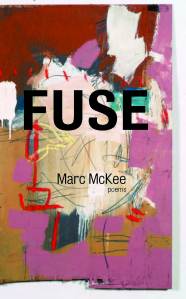|

Marc McKee
Fuse
Black Lawrence Press
2011
$14.00
Let me resist the temptation to amplify this review with puns involving sparks or bombs, about setting things on fire, alight, or anything to do with ashes or fuselage or spent fuel. It’s been done already by the folks blurbing the back of Marc McKee’s impressive debut full-length collection from Black Lawrence Press. And to great effect. Dean Young says, “Always explosive and lit, FUSE burns with the fury of a many-minded intelligence….” Marie Howe adds, “FUSE is lit with velocity and visible song—the singing so fierce and sweet….”
Instead, what I want to tell you about Marc McKee’s poems is that they balance on the exact edge between life and the cost of living, that they bounce off the not-so-padded walls of the human condition like a supernatural echo. Often elegiac, McKee voices the lines of the after hours, of the bottom of the glass, of the last drag off a Kool smoked by somebody hitching a ride out of town at 3 a.m. on a Wednesday when nobody was looking. He collages aphorisms to incantatory effect: “Tell me memory / is not a glass globe singing with wanting to be / shattered, that experience can live up / to itself, that some valleys don’t resemble / the mouths of crocodiles….” He’s ridiculously good with metaphor, pacing: “Enough is a country // you will never mail a postcard / from.” Or, “Gods are just the best we can come up with / when pressed for a universal alibi…” Neither his forthrightness nor his honesty swerve for political correctness or the pervading jet stream of the popular spin cycle: “The world is a place of delicious grandeur,” he writes in the opening lines of “Plenisphere,” “where automatic weapons are made.”
And McKee crafts each poem with the urgency of a man whose finger is always on the button—as if each poem might be the last one he or anybody else will compose. Yet, he writes with genuine tenderness and poignancy where others might charter sentimentality. Here’s an excerpt from “I Know or Maybe,” an elegy for a maternal grandmother. Listen closely for the conflated notes of both early and late James Wright in its phrasing and gestures:
So I’m standing on Camellia’s balcony
drinking black coffee. Smoke pours out of me
just breathing! and it has dipped below
40 degrees…. Once it was darker
than Guinness poured into a black glass
and maybe this is progress.
Maybe this is forgetting….
Sometimes McKee turns sarcastic. Sometimes he’s magnetized toward the rhetoric of argumentation. Sometimes he rolls both impulses together, as in “Is Not This Salad Everything You Wanted From a Salad?”, where even a humble meal good for the heart turns into existential inquiry. Sure, it’s satirical and hyperbolic, good for a laugh if read to an audience out loud. But it’s also really damn good. “Unless this salad,” McKee writes, “gets a lot better at hiding something, / we’re still going to get splinters…” And each and every one of us will eat that salad, or will be standing in line at the salad bar that serves it, for the rest of our lives.
Other critical inquiries are more directly philosophical nature, though no less comic in how they question and propose absurdities simultaneously, so much so that McKee invents his own word at least once:
In realism, O’Hara dies
of something completely unludicrous. No one goes
walking out of Denny’s real casual-like
with a pot of steaming coffee in one hand
while the other hand waves a goodbye
that isn’t a goodbye as much as it’s a wink.
In the middle of the book is a long poem, “Serpentine Fuselage,” most notable for its use of space, for the presence of absence. Sometimes the poem stops in the middle of a line before continuing on the next page right where it left off, as if the speaker of the poem decided arbitrarily to drop anchor only to set sail again an instant later at high tide. All told, the poem covers fourteen pages. It’s a rarity by today’s standards, when much of American poetry specializes in the shrink-wrapped lyric. The poem is flawed, but it’s proud of its flaws, a notebook recording the internal monologue of contemporary society rather than one individual’s thoughts, where even outrage about gas prices is not only welcome but a bold metaphor: “To get somewhere far away, 10 dollars, / a credit card and half a tank of gas should be enough / but rarely is.” In a poem like this, and so many others, McKee finds a way to describe what’s it’s like to be alive in the here and now: “My occupation is wandering, / thinking the world a game of Tag where / you are always IT and hidden from view.” Whatever you’re doing right now, stop. Go buy this book. It’s your turn, McKee suggests, to be chasing after something too.
--Jay Robinson
---
Jay Robinson is a Visiting Professor of English at Ashland University; he’s also taught Creative Writing and English Composition at The University of Akron. Along with Mary Biddinger, he’s Co-Editor-in-Chief of Barn Owl Review. Poems have appeared in 32 Poems, Anti-, The Laurel Review, and North American Review, among others. Prose has appeared in Poetry and Whiskey Island.
Also by Jay Robinson:
Review of The Silhouettes by Lily Ladewig
|
|

